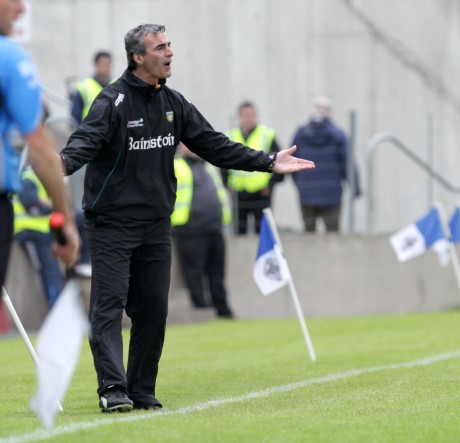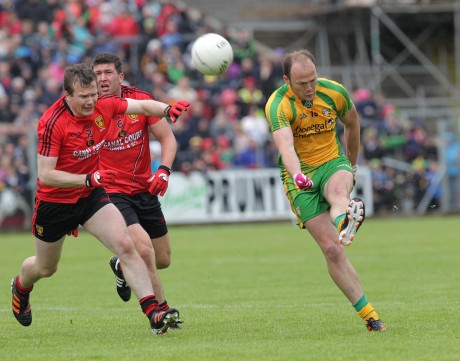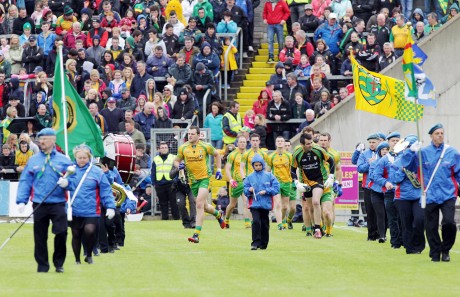
Jim McGuinness on the sideline last Sunday. Photo: Donna McBride.
BY CHRIS MCNULTY
c.mcnulty@donegalnews.com
WHEN British speed skater Sarah Lindsay stood in the heat box just before the first race in the 500-metre speed skate at the Winter Olympics in Salt Lake City eleven years ago, she was on the back of a few high-profile ‘chokes’ and was determined not to buckle again.
With every passing second, Lindsay repeated a mantra. It was audible; a peculiar experience for those who would’ve heard her.
“It’s only speed skating, it’s only speed skating, it’s only bloody speed skating!” she reminded herself.
“You are so desperate to win that you can become unhinged, instead of getting uptight I just kept repeating it,” Lindsay later explained.
The point of it was that it may have been the grandest stage of all in her sport, but the lines were the same, the technique the same as it was during those quiet training sessions away from the crowds. Lindsay upped her performance in Salt Lake City and placed well above her expectations.
It was a trick of the mind in a way, but it was one that had the desired effect on Lindsay.
It was taking the complexities to the most basic, simplistic level. After all, it was only speed skating.
The same principals apply to Donegal and its footballers these days.
Last Sunday, Donegal were faced with one of the ferocious challenges they’ve come up against. Perhaps it was that it took the rest of us by surprise. Jim McGuinness talked of feeling tension coming from the stands, but all the while his players stood tall, the retained their shape and, really, it was not a game that Donegal looked likely to lose at any stage.
For them, it seems as if it is a case now of ‘it’s only football’.
The key to the complexities of Donegal’s system lies in its simplicity and its perfection.
“You could feel that there was a tension building when Down were closing the gap, but I still felt that our fellas would find a way and keep doing what they had been doing in the lead up to the game,” McGuinness said.
His team led from start to finish. They gave up no goal chances and, while it may have been an unconvincing win of sorts, it was still an impressive one in that they won by three points, responding each time Down threatened to press the button and this was without passing up any real goal chances. The one cavaet there, though, is that there were passages when the Down threat was a real live one, but there is a sense there that Donegal would have been able to conjour up the magic had it been needed.
How many teams would have choked on Sunday, though? How many teams would have been able to stand in the face of those seeds being planted by Down and not allowed them bloom?
Donegal are, simply, unwavering in their belief in what they do.
The Arsenal manager, Arsene Wenger, once said: “No top performer has lacked this capacity for irrational optimism; no sportsman has played to his potential without the ability to remove doubt from his mind.”
Donegal have removed that doubt.
Colm McFadden’s scores are works of art in themselves; Michael Murphy kicks frees from close to 60 metres and make them appear as if they are his basic bread and butter. When McFadden swings around his man on the ‘45 and curls over a beauty, it is not a hit and hope, it is a player who knows deep down that he has the capability. The doubt is gone and he knows he can nail it. McFadden has touch, finesse and control, but most of all the sheer efficiency and clinicism that mark him as the game’s most deadly marksman now.

Colm McFadden gets the shot away against Daniel McCartan and Peter Turley of Down.
McFadden is of the old school.
He doesn’t do Twitter or Facebook, but he does read.
A book that has done the rounds in the Donegal camp is ‘Bounce’ by the former British table-tennis player Matthew Syed. It is a book that looks at ‘the hidden logic of success’ and is a fascinating read.
In one chapter, Syed deals with how the big occasions can lead to chokes. Like the time Jimmy White crumbled in the World Snooker final of 1994, or Greg Norman’s famous collapse in the 1996 US Masters and Jana Novotna’s painful regression in a game against Steffi Graf at Wimbledon in 1993.
Syed himself had experience. “We got to the point where we were effectively beginners,” he writes.
Donegal now compete without inhibition. They do their job to near perfection.
“Our mind space is the same: To try and be the best that we can be,” McGuinness says.
“Even if we are at our best this year, maybe Dublin will be a point or two better than us, or maybe Kerry will be. That’s just reality. For us, it isn’t about winning and it isn’t about losing – it’s about trying to get the message across to players as best we can and to feed that through the coaching process to get them to go out and be the best they can be.
“There is a disconnect between what people think about the Ulster Championship or the All-Ireland and what it’s like for us. We try to get it right and hope the players take it on board. Match day, for us, is about execution. It’s over the players at that stage. That won’t change.”
Donegal have now won ten consecutive Ulster Championship games under McGuinness. While Joe Kernan’s Armagh went ten unbeaten between 2004 and 2006, they had to negotiate two replays. Post-war, the Down team of the 1950s is the only team with an unblemished ten in a row. McGuinness is again on the threshold of a nugget of history.
In the ten games in the Ulster SFC under McGuinness, Donegal’s statistics are impressive. They have conceded just two goals. The first was a rebounded penalty by Cavan’s Michael Brennan in 2011 and the other was a penalty by Niall McDermott last year.
The 0-13 scored by Down in the 2012 Ulster final is the most conceded by Donegal in Ulster under McGuinness. Five times, including on Sunday in Cavan, Donegal have kept their opponents to single-figure scores.
It is upon that solidity that they have built a formiddable shell.
At the other end, they are no less impressive. Already this year, Donegal have displayed an efficiency that borders on eerie. McFadden and Murphy were forced to shoot from great distance last Sunday, but they remained unfazed. Donegal’s first wide wasn’t kicked until the 55th minute.
In two games, Donegal have scored 2-22, have had only six wides, dropped four short and had two blocked. Put another way, that means that Donegal have scored 24 times from 36 shots on goal in two games.
Since 1976, the Anglo-Celt has been retained just twice. Only once since 1961 has a three-in-a-row been claimed – when Armagh landed it in 2004, 2005 and 2006.
“We never talk about winning the Ulster Championship until we’re in the final,” says McGuinness.
“It doesn’t become possible until you win the other games. In doing that we give the opposition the respect they deserve – as a result of that, we haven’t been caught on the hop.
“For us it is not about three-in-a-row in Ulster. It is about what Monaghan or Cavan have to offer and about respecting that, then turning the lense back on ourselves and getting ourselves up to the best level possible.”
As regards putting in a defence of Sam Maguire, McGuinness has again swatted down the notion of topping the pile in September.
“It’s something that the media always fire up: Are you able to defend the Sam Maguire?,” he says.
“We never look beyond the game that’s ahead of us.
“We had a big, big challenge for Tyrone, then we re-caliberated for Down. If you’d listened to what was being said about Down, it was a foregone conclusion, but we knew it would be a very tough game.
“When you’re playing with a club and they beat you by eleven points, you know there’ll not be a repeat the next day. There is pride at stake. We were prepared for a tough battle – and that’s what seen us through.
“Say if we won the All-Ireland this year, people would just go: ‘Three in a row’. It’s a never-ending story.”
Even without some of their front-line battlers, like Karl Lacey and Neil Gallagher for the whole game last week; like Ryan Bradley and Frank McGlynn for the second half, Donegal have been able to negotiate a pathway to the final.
“They found a way,” as McGuinness put it.
There are few teams who could manage to cope without such an array – just look at the Kilkenny hurlers without Henry Shefflin, who is their Lacey, their Hurler of the Year.
Murphy and McFadden are the men who play the music, but it is usually Lacey who calls the tune: Think of those times when the pin-point arrows of the Four Masters man find Murphy’s paws and set up scores. His return will add a touch of class and will take Donegal up another level and will leave Donegal well primed to write another memorable chapter in McGuinness’ tale.
The manager’s zest has not drained, either.
He remains as hungry as ever in Ulster. His new role at Celtic FC not having impinged on his managerial duties, McGuinness not having missed training so far.
He couldn’t have.
“We’re absolutely together on everything,” he says, adding of his players: “They’re very level-headed, humble and down to earth. They’re there to work hard.
“Up until a couple of years ago, this is a group that was completely written off. They were the victim of a lot of negative press. That was the space they were living in. Now, they’re in a golden era in the county’s history. They understand that and they also understand that it mightn’t last forever. They understand that they must make hay when the sun shines and get the most out of their careers.
“That is the philosophy.”
That it is so simple perhaps makes it so complex: After all, it’s only football, isn’t it?
JIM MCGUINNESS’ PERFECT TEN IN ULSTER
2011 Ulster SFC
Preliminary Round Donegal 1-10 Antrim 0-07
Quarter-final Donegal 2-14 Cavan 1-08
Semi-final Donegal 2-06 Tyrone 0-09
Final Donegal 1-11 Derry 0-08
2012 Ulster SFC
Preliminary Round Donegal 1-16 Cavan 1-10
Quarter-final Donegal 2-13 Derry 0-09
Semi-final Donegal 0-12 Tyrone 0-10
Final Donegal 2-18 Down 0-13
2013 Ulster SFC
Quarter-final Donegal 2-10 Tyrone 0-10
Semi-final Donegal 0-12 Down 0-09

Donegal keen to get started after the pre-match parade in Breffni park for teh Ulster semi-final on Sunday. Photo: Donna McBride









